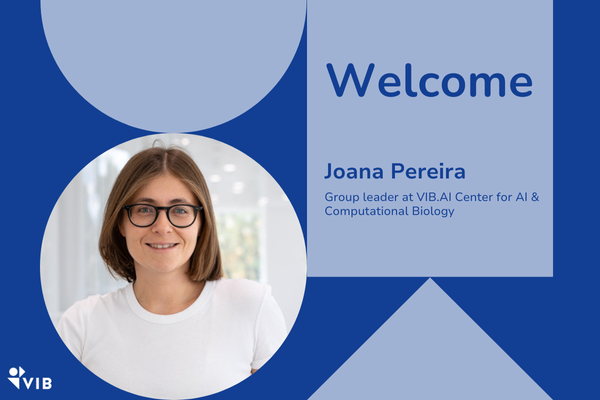Meet Joana Pereira
Joana joins VIB.AI: the Center for AI & Computational Biology as new PI
Originally from Portugal, following a PhD at EMBL (Germany) and a postdoc at Max Planck (Germany) and Biozentrum (Switzerland), Joana established her lab in Belgium in February 2025. The Pereira lab combines deep learning, network analysis, and bioinformatics to investigate protein diversity and evolution, aiming to reveal unknown protein families and evolutionary mechanisms. Her expertise aligns seamlessly with VIB.AI’s central mission to harness AI for transformative advancements in life sciences.
Let’s get to know her!
How are the first two months of starting a new lab? What is your first impression?
Crazy, chaotic, tiring, but extremely exciting! There's always something to do!
How would you describe your research to your parents?
I'm interested in understanding what all genes from all organisms do, and we develop computational methods to facilitate these studies. So, while the experimentalists will do experiments in the lab to check what these genes do, we will develop computational methods that would highlight which are the cool genes to look at.
What are some next steps you want to pursue in your research?
For example, I just got the Odysseus grant, so obviously, the next step is to grow the team with another PhD student and a Postdoc. We are now a fully computational lab. What I really would like to do is to have a little bit of an experimental side to the lab. I would like to hire an experienced researcher who can help me launch the wet lab side of the group.
If you had to keep one protein/family/fold, which one would it be?
I really like beta barrels in general. I'm fascinated by outer membrane beta barrels, which are these proteins found in Bacteria. They are the most common protein domain on the surface of Gram-negative Bacteria, and they carry out a huge variety of functions. They are doors and windows of the cell, but they also carry out reactions and so on. But the overall structure is actually quite simple, and you find it in other types of proteins, particularly like the beta flowers that we found!
What do you think the field will look like in 10 years?
I can’t know! The field is evolving so fast that I think it's very hard to say what it will be even in five years! My impression: it is going to be quite exciting! We already have structural models for almost all proteins in nature. Now, we are working towards having complexes, and people are thinking about dynamics and doing these dynamics on a large scale. Moreover, there's the direction now of having, for instance, digital twins where you can simply input a genome and a program describes what is happening inside of a cell or an organism. If you had asked researchers five years ago if we’d be where we are today, most wouldn’t have believed it.
If you were to compete in Belgium’s Got Talent, what would you do?
That’s a fun question! Most people don’t know this, but I love to sing. I was in a choir during my PhD and could cover most vocal ranges, though I didn’t enjoy it much. I’ve thought about taking lessons to develop a stronger technique. I’d love to sing rock or metal, but my voice naturally sounds too poppy.
If you had not made it as a scientist, what would you have become?
Baking! It’s in my genes. My great-grandmother was a village baker, and a relative even started a bakery chain in Brazil. I used to spend afternoons baking with my grandma, and that’s where my passion started. My brownie recipe is already perfect for Swiss chocolate, I just need to fine-tune it for Belgian chocolate!
What advice would you give to young graduates?
Don’t be shy and talk to people! Networking is crucial. Conferences aren’t just about science; they’re about meeting people. Talk to big names in your field, but also connect with your peers. Some of the PhD students I met early on are now leading research groups or working in industry. Those relationships last. Attend conference dinners, poster sessions, just put yourself out there.
What has been the most rewarding moment in your career?
My PhD opened incredible opportunities. Through the CCP4 network, I traveled the world, taught workshops, and connected with so many people. It was an amazing experience! I learned a great deal about protein structures and even had the chance to teach internationally. That experience shaped my career in ways I never could have imagined.
Welcome to VIB, Joana!
Want to be kept up-to-date on our biotechnological news and stories? Join our community and subscribe to our bi-monthly newsletter.



